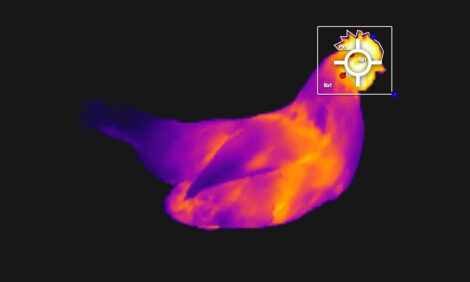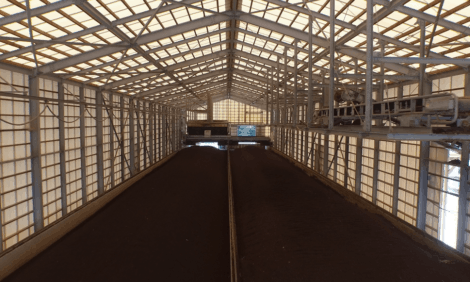



EU Poultry Industry Overview, October 2003
By the USDA, FAS - This article provides the poultry industry data from the USDA FAS Poultry and Products Annual 2003 report for the European Union. A link to the full report is also provided. The full report includes all the tabular data which we have ommited from this article.Report Highlights
The EU poultry sector could experience significant changes in the coming years as farmers’ react to the Midterm Review, the Russian TRQ, this summer’s heat wave and the imminent accession of 10 new member states. EU chicken production is returning to normal following outbreaks of avian influenza while turkey production remains stable.
Executive Summary
The overall EU poultry market is stable, yet returning to normal as the Dutch, Belgian and
German markets recover from the avian influenza outbreaks. Export refunds were introduced for
turkey poults to all destinations except the USA and Estonia. There was not change to export
refunds for poultry meat.
Despite recovery in EU markets from avian influenza, the EU poultry sector could experience
significant changes in the coming years from various market forces. First, farmers’ react to the
Midterm Review as they make projections and plan for the 2004-2005-market year. Second, EU
farmers will have to find ways to compensate for the January 2003 announcement by Russia of its
tariff rate quota, which is expected to limit imports of beef, pork and poultry. Third, this
summer’s heat wave. The EU does not currently have statistics on the effects the drought has had
on the poultry sector. And finally the imminent accession of 10 new member states in 2004,
which means that previous extra-EU trade figures will become intra-EU trade figures.
Chicken
EU chicken production in 2002 & 2003 is expected to return to normal levels by 2004, as poultry
production in the Netherlands returns to normal levels following the Avian Influenza outbreak.
Increases in EU chicken production are also expected in Spain, Portugal and Germany, which is
should offset the predicted decrease in poultry production in France.
EU chicken import figures remain unchanged from previous 2002 estimates, however 2003
estimates indicate a decline in EU imports. In August of this year the EU will close a loophole,
which previously allowed large quantities of salted meat from Brazil and Thailand to enter the EU
market. The closing of this loophole effect overall EU import figures. The declining import trend
is expected to continue through 2004.
In 2003 overall EU exports are expected to decline, as French exports to the Middle East remain
stable. German exports remain stable and the Netherlands has virtually no exports to third
countries in 2003. These overall decreases in exports are not expected to be offset by a marginal
increase in exports from Spain.
EU domestic use in 2003 is expected to decrease in line with decreases in consumption. Part of
the decrease in overall EU domestic consumption can be attributed to low production levels,
which was the case in France. Commercial stocks in France were reduced, reflecting a depletion
of commercial stocks, explaining the large disappearance in commercial stocks in France.
Germany on the other hand shows a marginal increase in domestic consumption due mainly to
population growth and because chicken remains an easy to cook and healthy option.
Turkey
Forty percent of EU turkey production takes place in France, although Italy and Germany are also
large producers. EU turkey production in 2002 has been has been adjusted downward from
previous 2002 estimates. In 2003 EU production will show an overall decline as France, the UK,
Italy, and the Netherlands all show declines in production. Additionally, in France the French
Turkey Producer’s Organization (CIDEF), imposed a mandatory destruction of turkey eggs to
prevent overproduction. As the lack of demand is forecast to continue into 2004 EU turkey
production is expected to decline.
EU imports in 2002 have been adjusted upward from previous estimates mainly because of
increased turkey consumption in the Netherlands. Additionally, large quantities of imports of
salted meat entering the EU, 30% of which are turkey attributed to the increase. In 2003 into
2004 EU turkey imports are forecast to be stable. Some salted turkey is expected to enter
Germany.
Overall EU exports are down in 2002 from previous estimates due mainly to the decline in French
exports and as the French experienced third country competition in the Russian and African
markets. The Netherlands also experienced difficulties in the export market due to Avian
Influenza. In 2003 into 2004 overall EU exports are expected to continue the downward trend.
EU poultry exports are also hurt by the strong Euro.
Domestic Use in 2002 shows an overall increase in commercial stocks, which hides the increase
in actual domestic use. In 2003 into 2004 total use is expected to be down from previous levels
indicating a decrease in consumption as well as a decrease in ending commercial stocks.
Policy
Animal Welfare
Consumer health Commissioner Byrne continues to emphasize the priority of Animal Welfare
issues for the Commission however states a full analysis and consultations are still necessary.
Commissioner Byrne has also re-iterated that his principal objective is to promote measures to
enforce enhanced animal protection rules, particularly for long distance journeys.
The basis of the animal welfare movement in the EU results from the guidelines in the Treaty of
Amsterdam, in force since 1st May 1999, which lays out new ground rules for the actions of the
EU on animal welfare in the “Protocol on the Protection and Welfare of Animals” This protocol
recognizes that animals are sentient beings and obliges the European Institutions to pay full regard
to the welfare requirements of animals when formulating and implementing Community
legislation.
Additionally, export refunds for live bovines will be subject to tighter animal welfare
requirements following the adoption of a new Commission regulation. The regulation is part of
the Commission’s drive to reinforce the conditions and controls under which export subsidies for
live animals can be granted.
Animal By Products
EC Regulation 1774/2002 is, after the TSE Regulation adopted in 2000, the second key action of
the EU’s White Paper on Food Safety and is a major component of the Commission strategy to
combat and eradicate feed-borne food crises such as BSE, foot and mouth disease, swine fever
and dioxin contamination. Under the Regulation, only materials derived from animals declared fit
for human consumption following veterinary inspection may be used for the production of feeds.
It also bans intra-species recycling, so-called "cannibalism". It sets out rules on what must and
may be done with the excluded animal materials, imposing strict identification and traceability
system requiring products such as meat and bone meal and fats destined for destruction to be
permanently marked to avoid possible fraud and risk of diversion of unauthorized products into
food and feed. This regulation will be fully enforced in January 2004.
Food Hygiene
The Council reached a political agreement on two legislative proposals in the “food hygiene”
package. Hygiene 3, which is a proposal for a Regulation laying down specific rules for the
organization of official controls on products of animal origin intended for human consumption,
and Hygiene 5, which is a Directive repealing certain Directives concerning food hygiene and
health conditions for the production and placing on the market of certain products of animal origin
intended for human consumption. A common position was not adopted as many delegations
wanted to wait until after the text had been technically finalized, which is expected in September
of 2003.
Once this is completed the proposals will be forwarded to the European Parliament. The
Hygiene package aims to overhaul 17 current Directives and replace them with 4 Regulations and
a Directive aimed at merging and simplifying EU legislation on hygiene. As an agreement has
now been reached on the 5 pieces of legislation, the entire Hygiene Package is expected to be approved at the September Council, and then forwarded to the EP for political agreement by 2004,
with an expected 2006 enforcement date.
Visit our website: www.useu.be/agri/usda.html provides a broad range of useful
information on EU import rules and food laws and allows easy access to USEU reports, trade
information and other practical information.
Further Information
To read the full report please click here
List of Articles in this series
Poultry and Products report highlights for Various Countries
Poultry and Products report for Indonesia
Source: USDA Foreign Agricultural Service - 21st October 2003








